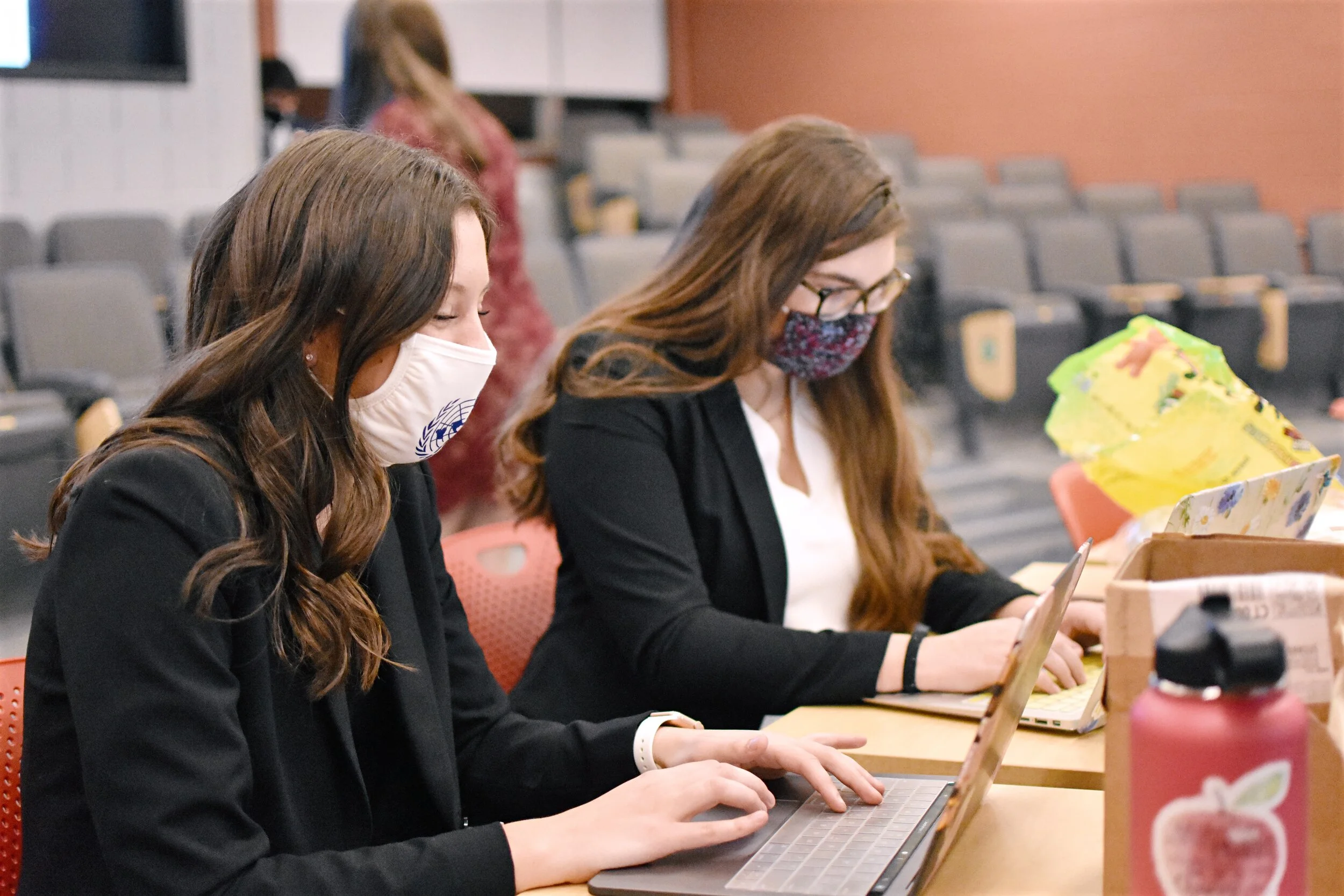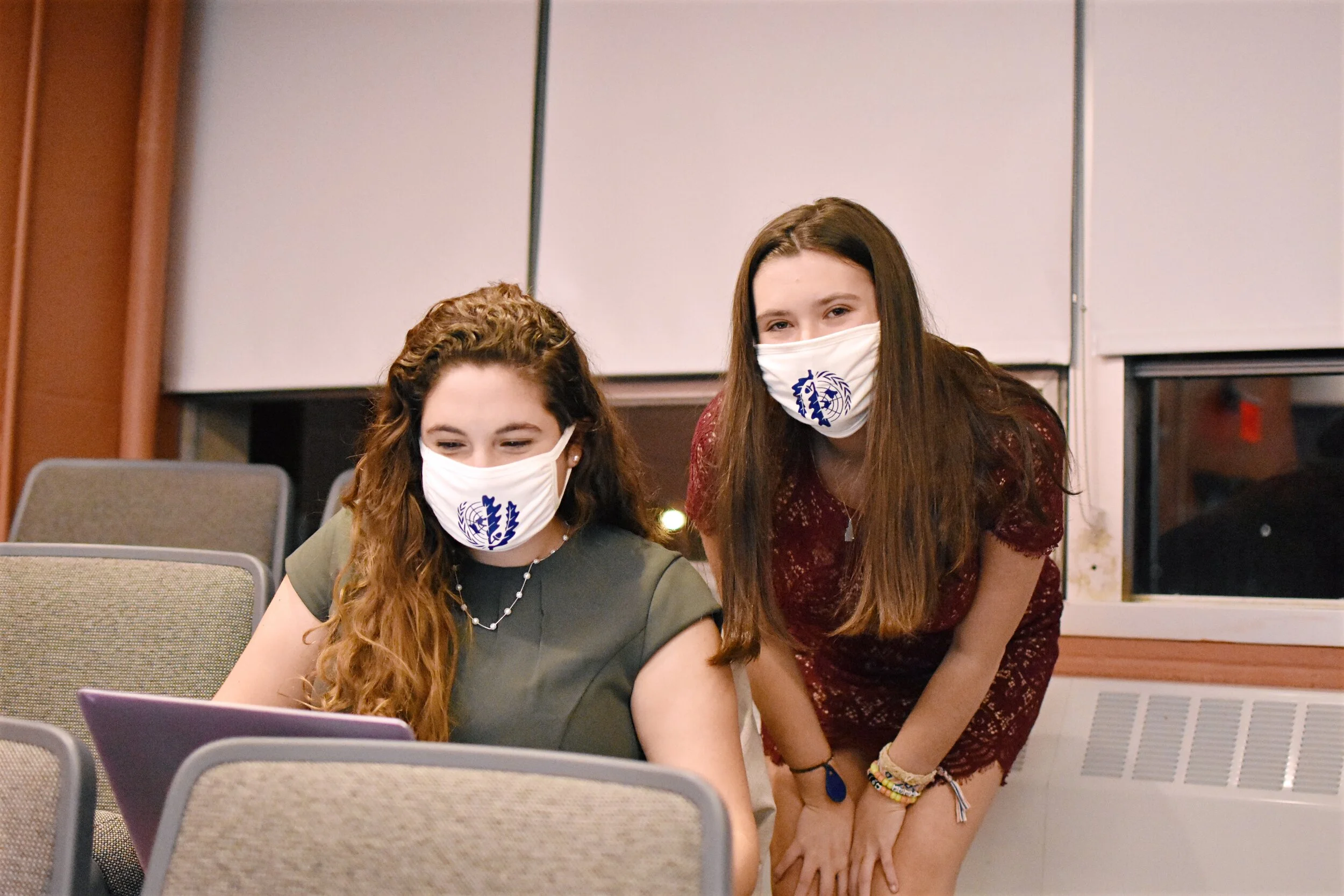Friday, November 6, 2020
Alisa Mujakic (Chief of Staff) and Aubrey Peterson Hague (Director-General)
Screenshot is from the United Nations Security Council
Katie Smith (Community Outreach Coordinator) and Erin Dennehy (Secretary General)
Counter- Terrorism Committee
The agenda and rules for discussion are laid out for the delegates
A small ice breaker of human bingo is led
Africa: “Any address of interruption in government is essential”
Disarmament and International Security Committee
The United States begins the discussion by talking about some of the attacks on security in the United States, as well as speaking on the amount of mass shootings that have occurred in the United States.
New Zealand: “If we can work together as a united group, we can work together to solve a lot of problems.”
New Zealand reflects on the Internet and how it has been the cause of violence in the country.
There is some discussion of the Dark Web amidst some technical difficulties.
Commission on Crime Prevention and Criminal Justice
In the beginning of the discussion, the issues on the table are cybercrime and black market Trading.
Moderators stress the importance of learning within discussions above all else (7:28).
Moderators ask delegates if there are any motions at this time.
Venezuela points toward a motion to address Topic A (cybercrime) over Topic B (black market trading).
The United States agrees that issues in cyber security should be addressed before issues regarding black market trading as cybercrime threatens economic superiority in the United States.
Mexico takes an opposing stance and states that they believe black market trading, along with drug trafficking, which is a current issue in Mexico, is a more pressing topic than cybercrime.
Following the Break:
The topic of interest is addressing cybercrime.
Guatemala expresses the need to determine consequences for cybercrime in order to deter cybercrime.
The United Kingdom claims that it is unfeasible to create country orientated solutions. Instead, the United Kingdom plans to raise cost and raise risk of cybercrime in order to deter cybercrime.
The United States suggests that it is important to hold countries accountable, but also to make it bulletproof as well. The United States brings up their own National Cyber Investigative Joint Task Force and how it has been successful in regards to the preservation of their national security.
In conclusion, the United States suggests that delegates utilize ideas from their own task force for their own security.
United Nations High Commissioner for Refugees
The United States has entered the meeting room, which allows the meeting to presume (7:38).
Topics consist of Refugee Camps in Sub-Saharan Africa and Climate Refugees.
Somalia: Despite agreeing with Nigeria that radical groups are an issue, however “Climate is a more prevalent and pressing issue”.
A speaking time of one minute is agreed upon delegates for the speaker list.
Social, Cultural and Humanitarian Affairs
The topics of discussion are Climate Vulnerability and Enforced Disappearances.
Lithuania speaks in regards to their decrease in gas emissions and their increase of efficient energy.
Kenya regards their adaption to better support the environment as funded by the United States in U.S aid. This has allowed more natural resources and preserved the land of Kenya.
Following the Break:
Despite Lithuania already having success in regards to climate adaptation and environmentally sustainable changes, they address other delegates on ways to help underdeveloped countries to develop in green and sustainable ways.
Lithuania then begins to ask other delegates on their dependence on oil.
Iraq chimes in to say that Iraq is not dependent on oil, but more so exporting oil.
Nepal believes that there is a significant concern with funding, as the committee doesn’t generally get funded, therefore the committee cannot rely on funding. Instead, what should be done is create sustainable and lower cost ways to help the environment.
United Nations Security Council
Moderator remarks on the motion to censor order that is unique to the United Nations Security Council. This notion goes as “I motion to censor (delegate) for (amount of time). This notion is often thought of as one of the worst diplomatic insults, and is they cautioned to delegates when using it.
United Nations International Children’s Fund
India, Mexico, Netherland, Nigeria, Pakistan, Russia, and the United States discuss ways to tap into child trafficking in Room A, separate from moderators.
Nigeria, Mexico, and India discuss how Non- Governmental Organizations (NGO’s) have established victim shelters, however these shelters are not up to standards, therefore trafficking is still a pressing issue.
Russia looks toward the possibility of increased funding for UNICEF.
India to Russia: “What could be the possible backlashes and conflicts to this general idea (creating solutions to child trafficking)?”
Russia explains to India that garnering support for the idea is less of the issue, as it is a pressing issue, and many would agree that child trafficking is something that needs to be taken seriously. The question is more so how it would be funded.



